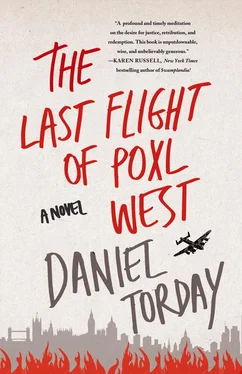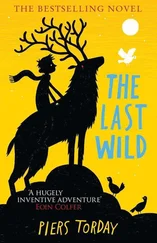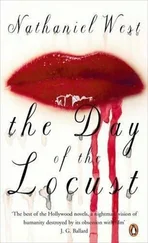But on the back was a full-page grainy black-and-white photograph of my uncle with his arms crossed, feet spread to the width of his shoulders. He stood in front of a tall oak. It was the kind of photograph you’d find on the back of a Stephen King or a John Irving novel at that time — in the days when a writer could become as famous as an actor or an athlete and ascend to the most visible ranks of American public life, could hope to meet Norman Mailer at a party, be reviewed in the Village Voice Literary Supplement. A kind of literary fame that’s hard even to fathom, let alone remember, now.
Uncle Poxl was everything a sententious musical at the Wang Center could never be.
“Can we get one?” I said.
“Poxl said he’d send us each a copy,” my father said. “He said he signed one for you already. Have some faith. It’ll come.” I didn’t argue. But whatever Poxl West did for me, in all the years after the publication of his book, he never did send me that copy. Some part of me will always be awaiting it.
I sat between my parents, who were still in their work clothes. My father was a tax lawyer at a corporate firm downtown, and my mother worked as an administrator at Mass General. They were more markedly not my uncle Poxl than almost anyone in my life — he was a writer and an artist and a war hero. He was about to stand up in front of an audience while they sat watching. My father’s father had come from Latvia after the war and worked all the way from janitor to dean at the prestigious school where Poxl taught before his untimely death. My mother’s parents had left Romania after World War I and opened a bakery on Myrtle Avenue in Brooklyn. We saw my mother’s parents in New York only a couple times a year. My parents did their duty, making the best of their parents’ hard work, their modest but tangible successes. I did not want modest successes. I did not want to be a professional. At that point, I don’t know what I wanted, other than a hero. I wanted to listen to my uncle Poxl.
When Poxl caught my father’s eye on his way to the podium, we felt we’d been some part of that life he’d led, a life so Odyssean and outsized we couldn’t help but listen. Some young hip professor from the Brandeis English Department in a pair of paint-splattered Guess jeans and a salmon sports coat rolled to his elbows talked for five overstated minutes about Poxl West’s nearly instantaneous place in the canon of Jewish chroniclers of World War II. His speech was full of humorless references to Eastern European writers I’d never heard of, writers who’d not even been translated into English yet.
Then Uncle Poxl stood.
Without shaking the professor’s hand, he put his mouth very close to the mike.
“Before the night is through I would like to read to you from the climax of my memoir, a memoir that is ultimately about love and love’s limits, but which contains certain inevitable passages describing as yet unspoken vengeance against the German horror,” he said.
Speakers popped. He moved back from the microphone a few inches, found his place behind the podium.
“To begin, I’d like to show you a little of how the Lancaster bomber S-Sugar came to drop bombs on Nazi soil.”
Rain ticked against the windows as if to dispel the validity of the pathetic fallacy. Uncle Poxl read from a chapter describing how he and his cousins felt when they first learned of their parents’ fate during the war. Heads bowed toward chests all through the audience of maybe a hundred listeners packed into that small space when Poxl described what he knew of his mother’s deportation to Terezin. Poxl himself never looked up from his text, which was enormous and imposing as the Pentateuch in his narrow red fingers. Thin red spindles rippled out across his face as he turned to a passage describing his trip from Rotterdam to London by freighter, the fear of U-boat attacks present at every moment. And when he finally gave us what we wanted — and that audience wanted so much from Poxl West, the first Jew so many of us had heard of who had not only survived the Nazi threat but had combated it, literally — and narrated what happened the night he crawled into the cockpit of a Lancaster bomber, when he piloted a plane so that his bomb aimer could drop blockbuster bombs that created a firestorm that destroyed almost every building in Hamburg, it was as if every villain in God’s unholy world had been burned in the cauldron of fire my uncle Poxl had lit.
After he finished reading, after the thunder of applause that matched the tempest outside had subsided, the impertinent dandruffed graduate student we’d seen on our way in raised his hand. His was the only head that I hadn’t seen dropped in solemn sympathy during the reading. He’d watched, but there was something defiant in his demeanor.
“Mr. West, with all due respect, isn’t it possible we’ve reached a point of saturation with all the first-person accounts of this particular war?”
A hush fell. When I became a professor, or even just when I was a university student myself, I would have recognized this as the overzealous application of a graduate student’s desire to question everything he receives. Frankly, it wasn’t wholly unlike my attitude toward the stories of survivors I’d heard in Hebrew school. But I didn’t see the connection then. I wasn’t a professor yet, or an undergraduate. I was a kid at a reading, there to bask in my uncle Poxl’s glory, and here was some kid stepping all over it. I expected to see the nostrils on Poxl’s sharp nose draw in as they had the few times I’d seen him challenged. But we were close enough to see that no cloud passed his face.
“I haven’t ever considered such a question,” Poxl said. “This is my life as I lived it. I simply sat down and reported the heroism in which those around me on those harrowing days partook. I don’t think of things like ‘saturation,’ or other stories previously told about it.”
The audience had drawn just inches forward in their seats like grass pushed by wind when the question came; now that my uncle had handled it with aplomb, backs touched seats again. Clearly everyone expected that would be the end of it. But the graduate student continued.
“You haven’t,” the kid said. “Huh.”
An older man next to the kid stared at the side of his head like he might do something. Someone said, “The nerve,” with a bluster and propriety that sounded as if he had been the one in that Lancaster bomber and not my uncle.
Uncle Poxl’s demeanor still hadn’t changed. He stood in his chocolate brown Armani suit, with his shoulders drawn back, his hands along the wooden sides of the podium.
“I’d just say there’s a certain saturation point with a certain kind of story,” the graduate student said. “You know, in the way that Propp posited that there are a finite number of stories to be told at all, there are surely a small number of these. I just wonder what you can say that Primo Levi or Jerzy Kosinski or Elie Wiesel hasn’t already.” We’d been assigned Survival in Auschwitz, The Painted Bird, and Night at Hebrew school. I’d read Kosinski closest, and my uncle was no painted bird. He was a Jew who had killed Germans, who had sought the fight when others fled. He was the master of his own narrative. No one had handed me any Borowski, and Kertész hadn’t yet been translated into English, I don’t think. Not that it would have made much difference to me. I understand now of course that they had all fought their own battles, but I was a teenager, and wholly without patience.
Poxl West was the only hero I needed.
Now my uncle Poxl’s face spidered with red lines. He began to respond, but he stopped. A gray old man made a move toward the kid. My uncle’s face grew ever redder. The hipster Brandeis professor who had introduced him bumped the microphone with his rolled-sleeved arm on his way up to the podium. Speakers popped as they had when Uncle Poxl’s lips first hit it.
Читать дальше












